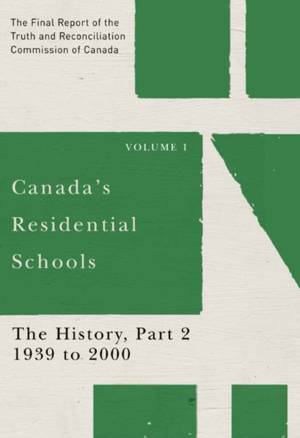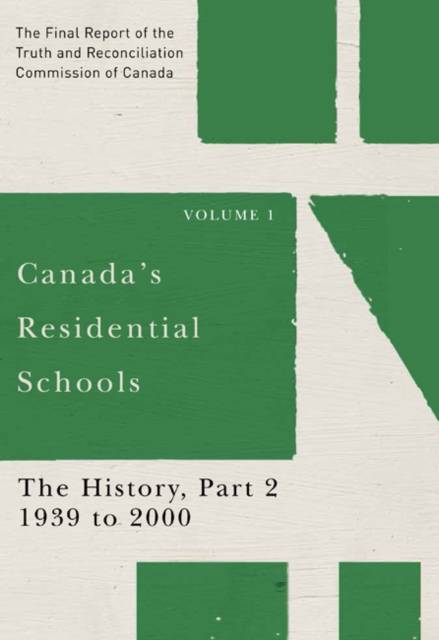
Bedankt voor het vertrouwen het afgelopen jaar! Om jou te bedanken bieden we GRATIS verzending (in België) aan op alles gedurende de hele maand januari.
- Afhalen na 1 uur in een winkel met voorraad
- In januari gratis thuislevering in België
- Ruim aanbod met 7 miljoen producten
Bedankt voor het vertrouwen het afgelopen jaar! Om jou te bedanken bieden we GRATIS verzending (in België) aan op alles gedurende de hele maand januari.
- Afhalen na 1 uur in een winkel met voorraad
- In januari gratis thuislevering in België
- Ruim aanbod met 7 miljoen producten
Zoeken
Canada's Residential Schools: The History, Part 2, 1939 to 2000
The Final Report of the Truth and Reconciliation Commission of Canada, Volume 1 Volume 81
Truth and Reconciliation Commission of Canada
€ 60,45
+ 120 punten
Omschrijving
Between 1867 and 2000, the Canadian government sent over 150,000 Aboriginal children to residential schools across the country. Government officials and missionaries agreed that in order to "civilize and Christianize" Aboriginal children, it was necessary to separate them from their parents and their home communities. For children, life in these schools was lonely and alien. Discipline was harsh, and daily life was highly regimented. Aboriginal languages and cultures were denigrated and suppressed. Education and technical training too often gave way to the drudgery of doing the chores necessary to make the schools self-sustaining. Child neglect was institutionalized, and the lack of supervision created situations where students were prey to sexual and physical abusers. Legal action by the schools' former students led to the creation of the Truth and Reconciliation Commission of Canada in 2008. The product of over six years of research, the Commission's final report outlines the history and legacy of the schools, and charts a pathway towards reconciliation. Canada's Residential Schools: The History, Part 2, 1939 to 2000 carries the story of the residential school system from the end of the Great Depression to the closing of the last remaining schools in the late 1990s. It demonstrates that the underfunding and unsafe living conditions that characterized the early history of the schools continued into an era of unprecedented growth and prosperity for most Canadians. A miserly funding formula meant that into the late 1950s school meals fell short of the Canada Food Rules. Overcrowding, poor sanitation, and a failure to adhere to fire safety rules were common problems throughout this period. While government officials had come to view the schools as costly and inefficient, the churches were reluctant to countenance their closure. It was not until the late 1960s that the federal government finally wrested control of the system away from the churches. Government plans to turn First Nations education over to the provinces met with opposition from Aboriginal organizations that were seeking "Indian Control of Indian Education." Following parent-led occupation of a school in Alberta, many of the remaining schools came under Aboriginal administration. The closing of the schools coincided with a growing number of convictions of former staff members on charges of sexually abusing students. These trials revealed the degree to which sexual abuse at the schools had been covered up in the past. Former students, who came to refer to themselves as Survivors, established regional and national organizations and provided much of the leadership for the campaign that led to the federal government issuing in 2008 an apology to the former students and their families.
Specificaties
Betrokkenen
- Auteur(s):
- Uitgeverij:
Inhoud
- Aantal bladzijden:
- 824
- Taal:
- Engels
- Reeks:
Eigenschappen
- Productcode (EAN):
- 9780773546523
- Verschijningsdatum:
- 9/12/2015
- Uitvoering:
- Paperback
- Formaat:
- Trade paperback (VS)
- Afmetingen:
- 173 mm x 246 mm
- Gewicht:
- 1655 g

Alleen bij Standaard Boekhandel
+ 120 punten op je klantenkaart van Standaard Boekhandel
Beoordelingen
We publiceren alleen reviews die voldoen aan de voorwaarden voor reviews. Bekijk onze voorwaarden voor reviews.









